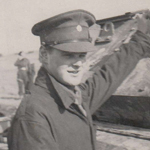|
Charles Farrell MC
Late Scots Guards
|
 Charles Farrell served with 3rd Battalion Scots Guards. He died aged 96 on 28th April 2015. He was born in Montreal in 1919, the youngest of four brothers. His mother, Eileen, was widowed when he was just five months old, and while he loved his native Canada, he never lived there. Charles Farrell served with 3rd Battalion Scots Guards. He died aged 96 on 28th April 2015. He was born in Montreal in 1919, the youngest of four brothers. His mother, Eileen, was widowed when he was just five months old, and while he loved his native Canada, he never lived there.
After being educated in northern England, he went to Christ Church College, Oxford, to read history. The war cut short his studies and he immediately joined 3rd Battalion Scots Guards.
Although he never spoke of it, even to his closest family, Charles was the youngest major in the British Army and won an MC and was Mentioned in Despatches for the role he played as a tank squadron commander in the 6th Tank Brigade in the Normandy invasion. His book, Reflections (2000), is an important analysis of the leadership and courage of our troops at that critical time, countering some more recent criticisms by those not then present.
Charles was involved in the division of Eastern Europe after the victory in 1945 and was deeply affected by the complex and politically charged decisions that had to be made and executed about the movement of people into what was to become the Soviet bloc. Fired up by these experiences, he was enlisted by MI6. He was stationed first in Singapore and then in Brussels as First Secretary, playing important roles in both regions. In the late fifties he left the Foreign Office to join British Sidac where he quickly rose up the ranks and ended up as managing director. At that time the company was a huge manufacturer of cellophane and he was proud to have built a joint plastics company with ICI at Wigton in Cumbria. The final part of Charles’ working career was spent in the art world. He started Christie’s Contemporary Art, which grew to be a public company.
Charles also worked hard for local concerns as a county councillor and as a member of the Oxfordshire Health Authority during the eighties. When, despite fierce local opposition, the NHS closed Watlington Hospital in 2000, he was the driving force in the campaign to retain medical facilities for the area. He chaired the charitable trust which he set up to raise funds - £2 million - to buy the hospital site, to negotiate with Sanctuary Care to build and run the new 60-bed nursing home and to battle with opposition from South Oxfordshire District Council, which, like the NHS, would have preferred to see housing on the site. A new, modern, GP surgery was also accommodated within the grounds. None of this could have been achieved without the tact, drive and attention to detail that Charles gave to this project over more than five years, when he himself was over 80. Around 1,500 patients, mostly from in and around Watlington, have been cared for at the home since it opened. Charles was most relaxed when surrounded by his large family and a bottle of ‘good ordinary claret’. He had four children, five grandchildren and a step family - all of whom he relished and for whom he always made time. By his side for 66 years was his wife, Kitty, on whom he wholly depended and who devoted her life to him.
|
|